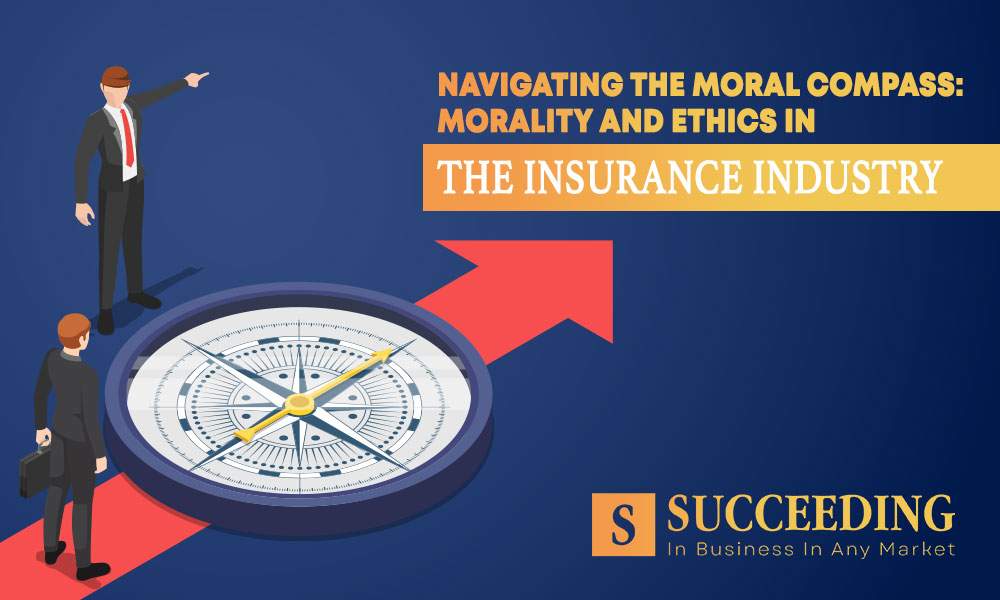Post Date: April 28, 2024

In the complex realm of financial services, the insurance industry plays a pivotal role in safeguarding individuals and businesses against unforeseen risks. Central to the functioning of this industry is the ethical conduct of professionals who handle policies, claims, and client relationships. This article delves into the intricacies of ethics and morality in the insurance sector, exploring the foundational principles, challenges, and crucial considerations that shape the industry’s ethical landscape.
1: The Foundation of Ethical Practices in Insurance
Ethics form the bedrock of any industry, and the insurance sector is no exception. At its core, ethical practices in insurance involve principles such as integrity, honesty, and transparency. These principles are not mere abstract ideals but are integral to building trust with clients and stakeholders. In an industry where financial security and trust are paramount, upholding ethical standards is not just a choice but a necessity for long-term success.
Insurance professionals are entrusted with the financial well-being of individuals and organizations. As such, the ethical obligation to provide accurate information, transparent policies, and fair treatment is paramount. The ethical foundation ensures that insurance operates as a mechanism for collective security rather than an avenue for exploitation.
2: Balancing Profitability and Ethical Responsibility
One of the perpetual challenges in the insurance industry is navigating the delicate balance between profitability and ethical responsibility. While the primary goal is financial viability, insurance professionals often grapple with ethical dilemmas. The pressure to meet business objectives can sometimes clash with the ethical imperative to ensure fair treatment of policyholders.
To illustrate this point, consider scenarios where insurance companies, in pursuit of profit, may be tempted to engage in practices that compromise the interests of policyholders. This section will explore such ethical challenges and present case studies that highlight the consequences of prioritizing profit over ethical responsibility.
3: Fair Treatment of Policyholders and Claimants
The ethical considerations surrounding the fair treatment of policyholders and claimants are pivotal to the industry’s reputation. Ethical conduct demands that insurance professionals provide clear information, fair pricing, and timely claims processing. Beyond regulatory requirements, a commitment to ethical principles is a cornerstone of customer satisfaction, loyalty, and the overall reputation of insurance companies.
This section will delve into the ethical obligations of insurance professionals, discussing real-world examples where adherence to ethical standards has positively impacted customer relationships and, conversely, instances where ethical lapses led to reputational damage.
4: Addressing Moral Hazards and Conflicts of Interest
Moral hazards, such as fraudulent claims and deceptive practices, pose ethical challenges within the insurance industry. Additionally, conflicts of interest can create dilemmas for professionals who must make unbiased decisions in the best interest of policyholders. This section will explore the nuances of these ethical challenges and provide insights into how insurance professionals can identify and navigate potential moral hazards while upholding their ethical obligations.
Drawing on industry experiences and best practices, this section will offer practical guidance on maintaining ethical integrity when faced with moral hazards and conflicts of interest.
5: Regulatory Compliance and Ethical Standards
Regulatory bodies play a crucial role in maintaining ethical standards within the insurance industry. Compliance with legal and regulatory frameworks is not only a legal requirement but also an ethical obligation. This section will highlight the relationship between regulatory compliance and ethical conduct, emphasizing the consequences of non-compliance.
By exploring real-world cases of regulatory interventions and their outcomes, this section will underscore the significance of adhering to ethical guidelines as a means of enhancing the credibility of the insurance industry and fostering a culture of compliance.
6: Ethical Decision-Making and Training
Ethical decision-making is a dynamic process that involves considering the implications of actions on various stakeholders. This section will explore the nuances of ethical decision-making within the insurance sector, emphasizing the importance of ongoing training programs to educate professionals on ethical considerations and dilemmas.
Drawing on successful ethical decision-making frameworks, this section will provide examples of how organizations can instill a culture of ethics through training and continuous education. It will showcase instances where a commitment to ethical conduct has positively shaped organizational culture and fostered a sense of responsibility among professionals.

Conclusion:
In conclusion, ethics and morality are the guiding lights that illuminate the path of the insurance industry. Upholding ethical standards is not only a moral imperative but a strategic choice that contributes to the industry’s sustainability and credibility. By navigating the delicate balance between profitability and ethical responsibility, treating policyholders and claimants with fairness, addressing moral hazards and conflicts of interest, complying with regulatory standards, and fostering a culture of ethical decision-making, the insurance industry can build a legacy of trust and integrity.
FAQs:
Q1: How do ethical principles contribute to the success of the insurance industry?
A1: Ethical principles, such as integrity, honesty, and transparency, are foundational to building trust with clients and stakeholders. They contribute to the industry’s long-term success by establishing credibility, fostering customer loyalty, and ensuring fair treatment of policyholders.
Q2: What challenges do insurance professionals face in balancing profitability and ethical responsibility?
A2: Insurance professionals often face challenges in meeting business objectives while ensuring ethical responsibility. Pressures to maximize profits can sometimes clash with the ethical imperative to provide fair treatment to policyholders. This balance requires careful consideration and strategic decision-making.
Q3: How does ethical conduct impact customer satisfaction in the insurance industry?
A3: Ethical conduct, including fair treatment of policyholders and transparent practices, positively impacts customer satisfaction. Customers are more likely to trust and remain loyal to insurance companies that prioritize ethical principles, leading to a positive reputation and sustained success.
Q4: How can insurance professionals navigate conflicts of interest and moral hazards ethically?
A4: Navigating conflicts of interest and moral hazards requires a commitment to unbiased decision-making. Insurance professionals can uphold ethical integrity by identifying potential conflicts, implementing transparent processes, and making decisions that prioritize the best interests of policyholders. Ongoing education and training also play a crucial role in navigating these ethical challenges.






